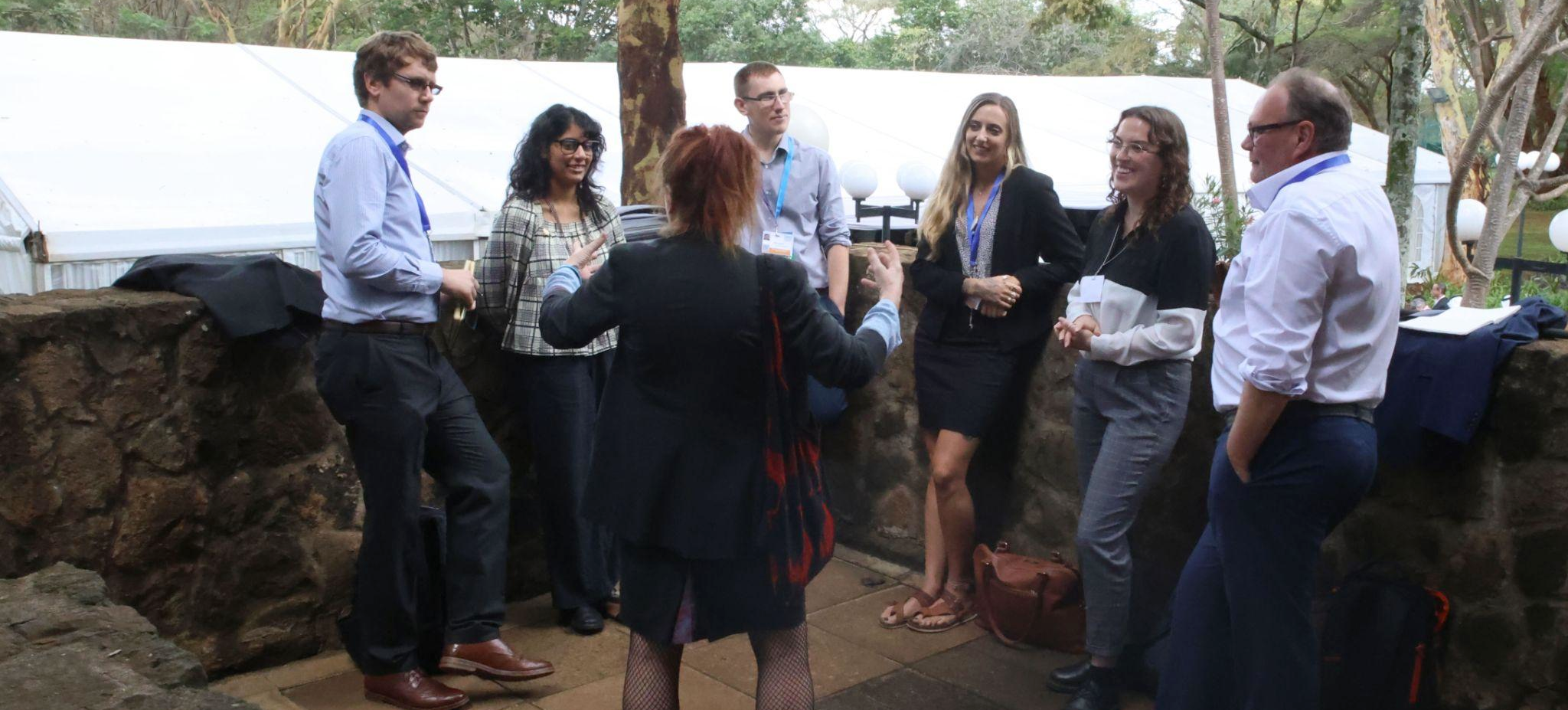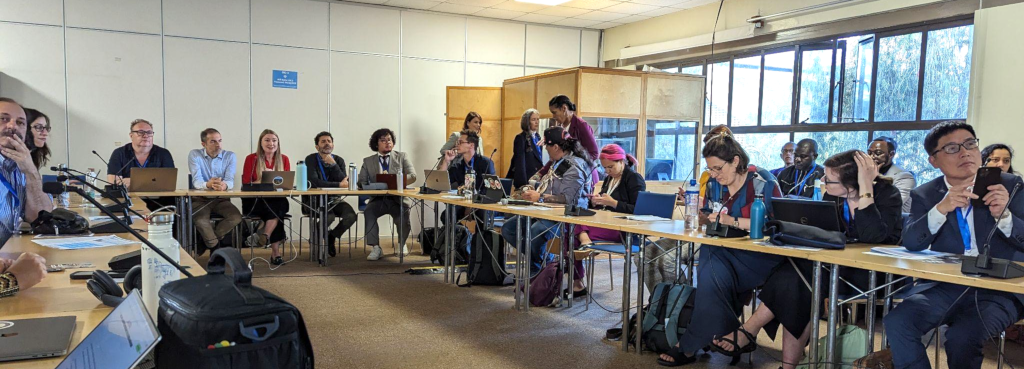
The mid-point of the week’s INC-3 negotiations in Kenya saw delegates dividing into contact groups to focus on specific challenges and side-events working to ensure key issues, such as re-use, are part of the conversation. Sam Winton, reporting from Nairobi, looks back on a day marked by both consensus-building and increasing polarisation on key sticking points.
Day 3 of INC-3 has seen the continuation of Contact Group discussions. In the morning session, I attended the deliberations of Contact Group 3. This Contact group has a slightly different mandate to Contact Groups 1&2 as it does not have a zero draft text to consider, instead seeking opinions on the Synthesis Report regarding matters not discussed at the committee’s second session for later input into the draft text. For this reason some discussion throughout the session centred around confusion from members about how their interventions would be reflected back to the plenary and incorporated. The Co-Facilitators of the Contact Group assured members that they are in regular contact with the other Contact Groups and the interventions will be fully reflected in the revised draft text.
As I joined the discussions this morning, the Contact Group was in the second half of its deliberations on Part A of the Synthesis Report, regarding the Preamble, Definitions, Principles, and Scope of the treaty. This conversation was broadly a more in depth continuation of interventions in Saturday’s Preparatory Meeting which I summarised in my second blog in this series. As the general topics of conversation were similar to those I have already summarised, I focus here on areas where there is now significant consensus, or broad divergence in views.

On preamble, there is clear consensus that the text should be concise and draw language from the preamble of Resolution UNEP/EA.5/Res.14. However there are also a broad range of views on what should be included including specific references to the Rio Principles, just transition, other MEAs, and the interlinkages of the triple planetary crises among others. The task to include all requested references, while maintaining a concise text, will be challenging. On Definitions, there is significant divergence on whether these should be discussed now in Contact Group 1, during intersessional work, or once all provisions have been agreed. There is also divergence on how these should be included in the text. There is a long menu of definitions that various members wish to include but little consensus on individual definitions. Principles follow the same pattern with significant divergence on the same topics and a similarly long, if not longer, list of potential options with significant divergence. On both Definitions and Principles it is hard to see a clear path towards any significant consensus at this time and I would anticipate that this issue will persist through potential intersessional work and INCs 4&5. On Scope, there is consensus that Resolution UNEP/EA.5/Res.14 should form the basis of the scope and that the full lifecycle of plastic should be addressed. However, there is divergence on where the lifecycle starts with one constituency of members believing it starts from the design of a plastic product and another believing it starts with raw material extraction. Consensus on this issue will be hard to achieve.
Our next substantive discussions focussed on Part B of the Synthesis Report on Institutional Arrangements. This topic received broad consensus across most issues. Notably there was consensus that the Treaty should convene a Conference of Parties as a governing body with a secretariat for support. Multiple members referenced the Minamata convention as a good model. There was also consensus on the creation of one or more subsidiary bodies to support the COP, to include a Science and Technical Body which would be multidisciplinary with equitable membership, and an Implementation and Compliance Body which should be supportive in nature and non-punitive. There was minor divergence regarding whether these bodies should be established by the COP or the final Instrument text. Contact Group 3 discussions will resume on Thursday Morning.
In the afternoon I attended Break Free From Plastic’s side event titled ‘Reuse solutions for the Global Plastics Treaty’. The panel discussed the ways in which reuse could be adopted into the Treaty and was well attended by Observers and Member Delegates. Reuse is a topic which my team at the University of Portsmouth has researched heavily over the past year including the publication of a policy brief ahead of INC-3 and the ‘Making Reuse a Reality’ report which we co-published with Break Free From Plastic. The discussion was engaging with interventions from leading experts in the field. Joan Marc Simon, Director, Zero Waste Europe opened the discussion making the point that if single use models internalised the costs they impose on society they would be no more financially profitable than reuse models. Steve Fletcher, Director of the Global Plastics Policy Centre at the University of Portsmouth, and head of the Portsmouth delegation at INC-3 spoke next about our recent research, calling for global reuse standards, reuse systems to be integrated in complementary policy landscapes, and collaboration and sharing of best practice. Miguel Roset, Executive Director, Retorna called for all drinks containers to be included in deposit return schemes to level the playing field with reuse schemes and for waste pickers to have a primary role in any reuse system, ensuring a just transition. Finally Rahyang Nusantara, Deputy Director, Dietplastik Indonesia shared lessons from implementing a reuse system at a music festival in Indonesia. Multiple panellists stated that closed loop systems such as festivals, sports stadiums and government buildings in particular, can be quick wins when implementing reuse systems. This conversation covered a critical topic. Our research suggests that the Treaty should make full use of reuse systems as an alternative to single use plastics, preferably in a dedicated Provision.

In the evening session, I attended the Contact Group 1 negotiations, a highly detailed discussion on potential elements of the Treaty. Initially, focus was on Part II, Provisions 3 (Problematic and avoidable plastic products, including short-lived and single-use plastic products and intentionally added microplastics) and 4 (Exemptions available to a Party upon request) of the Zero Draft. I note from the outset that these conversations had commenced in the afternoon session and therefore my comments may not fully reflect the views of all members. In addition to verbal statements in Contact Groups, Members can submit proposed revisions to the Zero Draft text to the INC Secretariat via email for inclusion in the updated draft. Therefore members’ full views will become significantly more clear once the revised draft is produced.
Provision 3 is split into 2 parts. Provision 3.a addresses problematic and avoidable plastic products, including short-lived and single-use plastic products. Members are expected to disallow, subject to material exemptions, (Option 1) or regulate and reduce (Option 2) the production, sale, distribution or export of problematic and avoidable plastic products. A number of interventions called for a sectoral approach to any bans/restrictions and there was divergence on which option to support, with intersessional work recommended to further investigate the issue. Provision 3.b addresses intentionally added microplastics. In common with Provision 3.a, Option 1 broadly calls for a ban, subject to material exemptions, on intentionally added microplastics while Option 2 calls for restrictions. Again there was significant divergence on the options. Proponents of Option 2 particularly favour a phased introduction of any restrictions and the adoption of nationally determined targets. Provision 4 provides potential exemptions to the above Provisions upon request to the governing body. There was consensus that this is a necessary provision to avoid issues for medical use and food security among others, with a large constituency of Members calling for any exemptions to be extremely specific and based on specific guidelines and procedures. These could include; requests made to an independent panel of experts, transparency and accountability, a clear management plan for the exempted material, and time bound limits to exemptions.
Conversations subsequently proceeded to consideration of Part II, Provisions 5 (Product design, composition and performance) and 6 (Non-plastic substitutes). For brevity, I group these discussions into 2 sections. Provision 5.a, 5.b and 5c deal with Product Design, Reduce Reuse Refill and Repair, and Recycled Content respectively. All Provisions have an Option 1 which sets out binding universal targets and/or minimum standards, in addition to an Option 2 which allows significantly more national determination. All 3 Provisions had significant divergence on which option to support. Notably one intervention called for a separate Reuse provision, and multiple interventions called for these Provisions not to be constructed in a way which would interfere with global trade. Provisions 5.d and 6 deal with Alternative Plastics and Non-Plastic Substitutes. On both Provisions there was convergence on the need for life-cycle analyses of any potential alternatives to avoid regrettable substitutes. Some members made clear that any alternative plastics are still plastic and would therefore be the subject of all other treaty provisions with one member requesting the removal of reference to alternative plastics altogether due to this fact, as they felt it undermined the Treaty. Another member made the point that biodegradable plastics should not be included as they degrade into microplastics (a topic which had been debated mere minutes previously) which I would fully endorse.
There was some convergence that the two Provisions should be merged as they deal with similar topics and have generally common considerations. At the close of scheduled deliberations, the Co-Facilitators announced that due to the rapidly eroding time in which to discuss the remaining Provisions, the Contact Group would continue to debate a further 2 Provisions in the evening, significantly extending deliberations. Members with smaller delegations felt that this would cause unreasonable challenges for them and agreement was made to draw proceedings to a close for the evening.
Overall this has been an engaging day of detailed discussions with significant progress made. While some areas of consensus and convergence are becoming clear there are still many areas of divergence which will need to be resolved. We will resume on the morning of day 4 with a final session of Contact Groups 1&3 before a stocktaking Plenary on Thursday afternoon where the full progress of contact groups will hopefully become more clear.
BIO
I am postgraduate researcher working for the Revolution Plastics team at the University of Portsmouth since it’s creation in 2020, and recently commencing my PhD studies ‘Exploring the development and outcomes of the global plastics treaty’ at the University of Portsmouth and the University of Surrey. With a background in environmental hazards and community preparedness, my main research focus is working with communities and a broad range of stakeholders to tackle environmental challenges. I have also conducted work with international organisations with a view to creating policies to tackle the global plastics problem, and facilitate sustainable development.

Interesting point that there is a divide between those who argue for the instrument to kick-in at the beginning of the lifecycle (extraction) and those who argue for the start point to be design. It will be fascinating to see how this plays out. If extraction is not on the agenda then the instrument will lose much of its potential power to create circularity in the lifecycle of plastic.